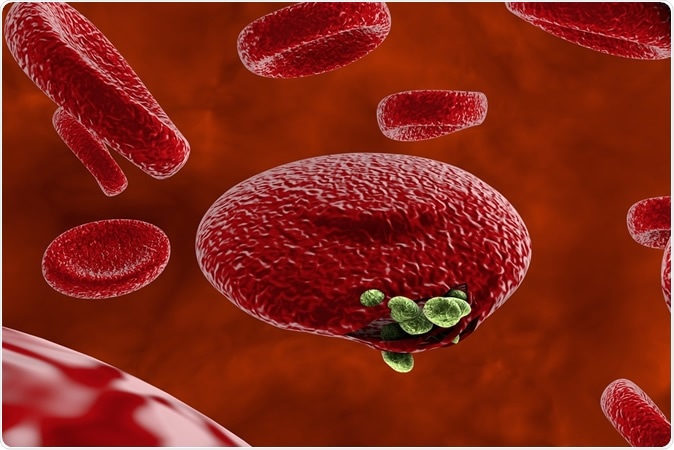According to the report, there is need for adequate funding and well placed and planned public health strategies that could ensure that within the next three decades, malaria could be a disease of the past. The malaria eradication programme is a collaborative effort of The Lancet and UCSF that created the Lancet Commission in 2017 that is focussed on global malaria eradication.

Release of malaria parasites from red blood cell. Image Credit: Kateryna Kon / Shutterstock
The report is titled, “Malaria Eradication within a generation: ambitious, achievable and necessary.” About the report the authors write, “In the first report of its kind and with a bold vision, the Commission lays the out the necessary steps, including an even greater financial outlay, strengthening malaria programmes and global leadership, and acceleration of research and development, to eradicate malaria within a generation.”
Sir Richard Feachem, Co-chair of The Lancet Commission on malaria eradication and Director of the Global Health Group at the University of California, San Francisco (UCSF), in a statement said, “For too long, malaria eradication has been a distant dream, but now we have evidence that malaria can and should be eradicated by 2050. This report shows that eradication is possible within a generation. But to achieve this common vision, we simply cannot continue with a business as usual approach. The world is at a tipping point, and we must instead challenge ourselves with ambitious targets and commit to the bold action needed to meet them.”
The team wrote that malaria incidence and deaths due to malaria has been steadily going down over the past two decades. Since 2000 for example there has been a 36 percent decline in new diagnoses of malaria and 60 percent decline in number of deaths due to malaria. The number of countries with endemic malaria was 106 in 2000 and this dropped to 86 in 2016. In 2016 there has been a highest of around US$4.3 billion expenditure aimed at reducing and eliminating malaria. The expenditure on malaria eradication was US$1.5 billion in 2000 says the report. Many of the countries across the world are thus free of malaria at present says the report.
Despite these encouraging numbers, there are still 200 million cases of malaria detected annually in some pockets of the world and half a million people still die of malaria each year. The report added that 55 nations in Africa, Asia and Latin America still have a high incidence of malaria and the funding for these nations have reached a plateau. Of these 29 nations account for 85 percent of the malaria related deaths says the report. These 55 nations are all located in Africa (except Papua New Guinea and the Solomon Islands) and 36 percent of the total number of cases around the world comes from two nations - Nigeria and the Democratic Republic of the Congo, says the report.
In these 55 nations the malaria parasite as well as the mosquitoes or the insect vectors of the disease seem to have become resistant to the available drugs and insecticides respectively. This resistance has successfully prevented the efforts to eradicate malaria in these nations says the report. Dr. Winnie Mpanju-Shumbusho, Board Member of the RBM Partnership to End Malaria and Co-chair of The Lancet Commission on malaria eradication, in a statement said, “Despite unprecedented progress, malaria continues to strip communities around the world of promise and economic potential. This is particularly true in Africa, where just five countries account for nearly half of the global burden. Malaria eradication is a public health and equity imperative of our generation.”
The report states that combined efforts to correct the socioeconomic hurdles and environmental approaches would help reduce the intensity of malaria incidence around the world by 2030 and by 2050 there could be possible eradication of the disease. The report added that the aim would be reduce the transmission of malaria in these pockets in Africa as well as to prevent resurgence of the disease in areas that have been free of it. The team writes that the aim would be to “bend the curve” of decline of malaria or accelerate its eradication until it is completely eradicated.
According to the Commission’s report the existing tools of malaria eradication are the “software of eradication” and need to be adhered to. In addition there is the “hardware of eradication” that are the new and novel tools that could be developed to combat the challenges posed by drug and insecticide resistance.
According to the calculations by the Commission, the required yearly increase in the funding to eradicate malaria would be to the tune of US$2 billion that could be donated by donor agencies as well as by the nations where malaria is endemic. Dr. Fred Binka, a Commissioner and Foundation Vice-Chancellor, University of Health and Allied Sciences, Ghana and one of the authors of the report, in a statement said, “Malaria eradication is a goal of epic proportions, and it will require ambition, commitment and partnership like never before. But we know that its return is worth the investment, not only by saving lives in perpetuity, but also improving human welfare, strengthening economies and contributing to a healthier, safer and more equitable world. The time for action is now.”
Dr. Tedros Adhanom Ghebreyesus, Director-General of the WHO, in a statement said, “The Lancet Commission makes a bold call for eradicating malaria by 2050. I would be thrilled to see this global scourge eradicated even earlier. But we will not achieve eradication within this time frame with the currently available tools and approaches...The good news is that we, the global malaria community, know what we need to do” He also called for more inflow of funds into the malaria eradication programme.
Source:
Journal reference:
Malaria eradication within a generation: ambitious, achievable, and necessary Feachem, Richard G A et al., https://www.thelancet.com/journals/lancet/article/PIIS0140-6736(19)31139-0/fulltext